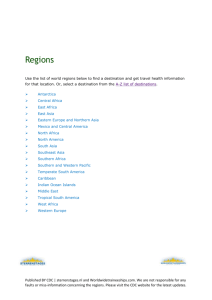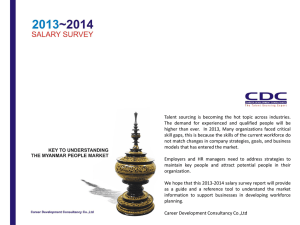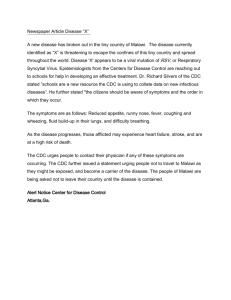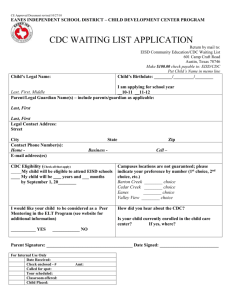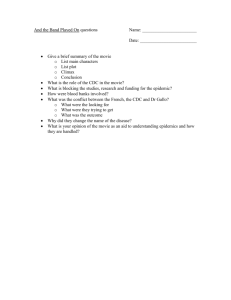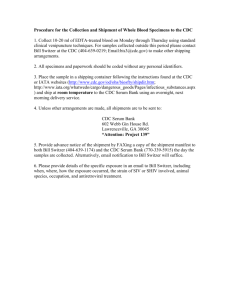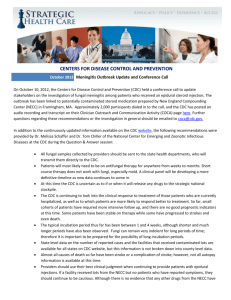Newsletter - May, 2012
advertisement
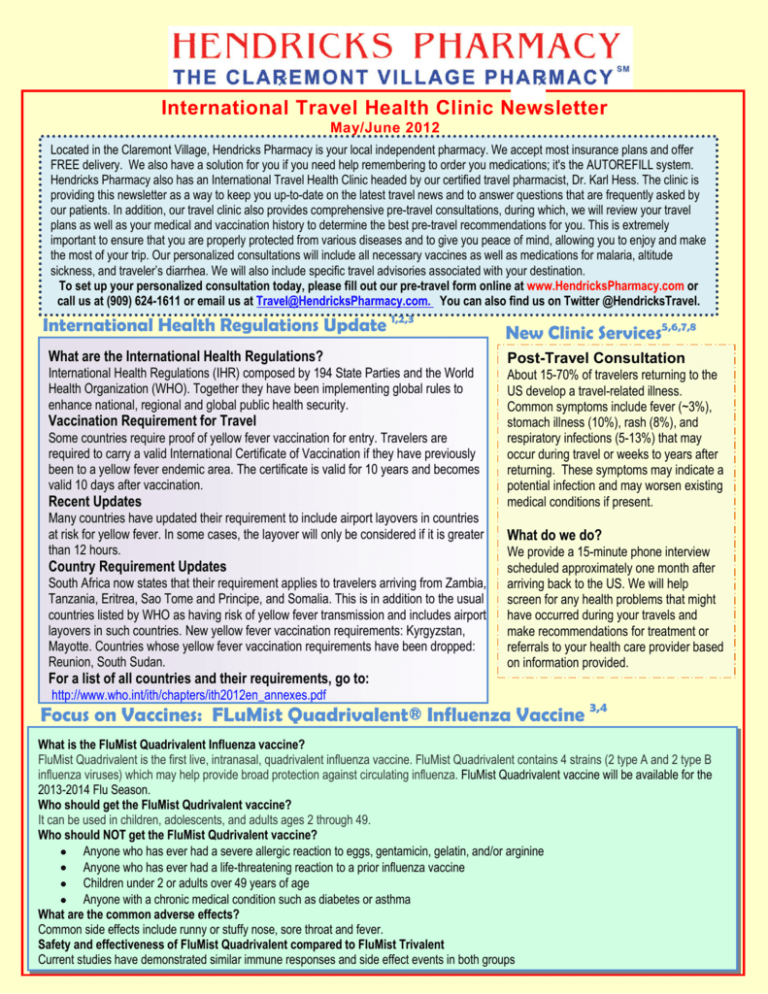
International Travel Health Clinic Newsletter May/June 2012 Located in the Claremont Village, Hendricks Pharmacy is your local independent pharmacy. We accept most insurance plans and offer FREE delivery. We also have a solution for you if you need help remembering to order you medications; it's the AUTOREFILL system. Hendricks Pharmacy also has an International Travel Health Clinic headed by our certified travel pharmacist, Dr. Karl Hess. The clinic is providing this newsletter as a way to keep you up-to-date on the latest travel news and to answer questions that are frequently asked by our patients. In addition, our travel clinic also provides comprehensive pre-travel consultations, during which, we will review your travel plans as well as your medical and vaccination history to determine the best pre-travel recommendations for you. This is extremely important to ensure that you are properly protected from various diseases and to give you peace of mind, allowing you to enjoy and make the most of your trip. Our personalized consultations will include all necessary vaccines as well as medications for malaria, altitude sickness, and traveler’s diarrhea. We will also include specific travel advisories associated with your destination. To set up your personalized consultation today, please fill out our pre-travel form online at www.HendricksPharmacy.com or call us at (909) 624-1611 or email us at Travel@HendricksPharmacy.com. You can also find us on Twitter @HendricksTravel. International Health Regulations Update 1,2,3 What are the International Health Regulations? International Health Regulations (IHR) composed by 194 State Parties and the World Health Organization (WHO). Together they have been implementing global rules to enhance national, regional and global public health security. Vaccination Requirement for Travel Some countries require proof of yellow fever vaccination for entry. Travelers are required to carry a valid International Certificate of Vaccination if they have previously been to a yellow fever endemic area. The certificate is valid for 10 years and becomes valid 10 days after vaccination. Recent Updates Many countries have updated their requirement to include airport layovers in countries at risk for yellow fever. In some cases, the layover will only be considered if it is greater than 12 hours. Country Requirement Updates South Africa now states that their requirement applies to travelers arriving from Zambia, Tanzania, Eritrea, Sao Tome and Principe, and Somalia. This is in addition to the usual countries listed by WHO as having risk of yellow fever transmission and includes airport layovers in such countries. New yellow fever vaccination requirements: Kyrgyzstan, Mayotte. Countries whose yellow fever vaccination requirements have been dropped: Reunion, South Sudan. For a list of all countries and their requirements, go to: New Clinic Services5,6,7,8 ,2,3 Post-Travel Consultation About 15-70% of travelers returning to the US develop a travel-related illness. Common symptoms include fever (~3%), stomach illness (10%), rash (8%), and respiratory infections (5-13%) that may occur during travel or weeks to years after returning. These symptoms may indicate a potential infection and may worsen existing medical conditions if present. What do we do? We provide a 15-minute phone interview scheduled approximately one month after arriving back to the US. We will help screen for any health problems that might have occurred during your travels and make recommendations for treatment or referrals to your health care provider based on information provided. http://www.who.int/ith/chapters/ith2012en_annexes.pdf Focus on Vaccines: FLuMist Quadrivalent® Influenza Vaccine 3,4 What is the FluMist Quadrivalent Influenza vaccine? FluMist Quadrivalent is the first live, intranasal, quadrivalent influenza vaccine. FluMist Quadrivalent contains 4 strains (2 type A and 2 type B influenza viruses) which may help provide broad protection against circulating influenza. FluMist Quadrivalent vaccine will be available for the 2013-2014 Flu Season. Who should get the FluMist Qudrivalent vaccine? It can be used in children, adolescents, and adults ages 2 through 49. Who should NOT get the FluMist Qudrivalent vaccine? Anyone who has ever had a severe allergic reaction to eggs, gentamicin, gelatin, and/or arginine Anyone who has ever had a life-threatening reaction to a prior influenza vaccine Children under 2 or adults over 49 years of age Anyone with a chronic medical condition such as diabetes or asthma What are the common adverse effects? Common side effects include runny or stuffy nose, sore throat and fever. Safety and effectiveness of FluMist Quadrivalent compared to FluMist Trivalent Current studies have demonstrated similar immune responses and side effect events in both groups Hendricks Pharmacy International Travel Health Clinic Newsletter Websites for Current Outbreaks For information on recent outbreaks and travel alerts throughout the world, visit these websites: http://wwwnc.cdc.gov/travel/ http://www.promedmail.org http://www.istm.org/WebForms/NonIstmLinks/Outbreak_News.aspx http://www.who.int/csr/outbreaknetwork/en/index.html Fact or Fiction? 18, 19 People traveling for extended periods of time may be at an increased risk for Deep Vein Thrombosis. FACT: Deep Vein Thrombosis (DVT) occurs when a blood clot forms in a large vein. If part of the clot breaks off and travels to the lungs, this is called a Pulmonary Embolism (PE), which can be fatal. The American College of Chest Physicians (ACCP) states that individuals traveling for more than 8-10 hours, whether by air, bus, train or car are more susceptible to DVT due to limited mobility and restricted blood flow. Someone with a family history or personal history of a blood clot is more likely to get a blood clot while traveling. FACT: For travelers on flights of 8 hours or more who have an increased risk for DVT/PE, the ACCP recommends frequent ambulation, calf muscle stretching, or sitting in an aisle seat if possible. Getting up occasionally, walking around, and stretching your legs while you sit do NOT help prevent DVT. FICTION: All of these are helpful strategies to avoid a blood clot during travel, especially for those with a family or personal history of Deep Vein Thrombosis. In addition, the guidelines suggest against the use of aspirin or anticoagulant therapy to prevent DVT/PE in long-distance travelers. For travelers who are considered to be at particularly high risk for DVT/PE, the use of antithrombotic agents should be considered on an individual basis because the adverse effects may outweigh the benefits. References 1. 2. 3. 4. 5. 6. 7. 8. 9. 10. 11. 12. 13. 14. 15. 16. 17. 18. 19. Facts – Malaria Prophylaxis 10,11,12,14 Chloroquine is generally the drug of choice in Central America. Other drug options that are also effective against the malaria causing protozoa, P. falciparum, include mefloquine, Malarone® (atovaquone/proguanil), or doxycycline. Primaquine may also be used in certain circumstances. Monday If the region of learning travel is known be chloroquine-resistant, Malarone® is Today we are abouttodinosaurs. often preferable because it can be stopped within 7 days of returning from Tuesday the malarious area and has minimal side effects. Other options include Today we are learning about pets. mefloquine or doxycycline Wednesday Primaquine is used for malaria prevention in two ways. First is primary Today we are learning about the solar system. prophylaxis in areas with predominantly P. vivax, for 7 days after leaving the Thursday malarious area. Secondly, it is used for Presumptive Antirelapse Therapy (terminal also knowntrip as to PART. When used for PART, Today weprophylaxis), are going on a field the zoo. primaquine is given for 14 days after leaving the malarious area. Before Friday primaquine is used however, a blood test to rule out G6PD deficiency MUST Today we have a special guest from the fire department to be done! tell us about fire safety. Resistance to Mefloquine has been documented in SE Asia, therefore, this medication should be avoided if traveling to Myanmar (Burma), Cambodia, Laos, Thailand, and/or Vietnam. Have more questions? Contact our Travel Health Clinic at travel@hendrickspharmacy.com or at 909-624-1611 Quick Travel Tips - Advice for Safe and Healthy Travel for Students! 9, 13, 15, 16, 17 Preparation Before Travel Is Key! Check with your physician to make sure you are in adequate health for travel. Make any necessary precautions for routine vaccinations and learn about any country/region specific vaccines that you may need. Write down phone numbers and other pertinent information about the US Embassies at http://www.usembassy.gov/ Before you leave, enroll with the Smart Traveler Enrollment Program (http://travelregistration.state.gov/ibrs/ui/) so that the Department of State can better assist you in an emergency. Lastly, be sure to make an appointment with a doctor familiar with travel health and medicine, such as our International Travel Clinic, at least 4-6 weeks prior to leaving! CDC: Yellow Fever, 2012. http://wwwnc.cdc.gov/travel/yellowbook/2012/chapter-3-infectious-diseases-related-to-travel/yellow-fever.htm. Accessed on April 27, 2012. WHO's 2012 edition of International Travel and Health http://www.who.int/ihr/en/ Accessed on April 30, 2012. FluMist Quadrivalent (Influenza Vaccine Live, Intranasal) Package Insert. FluMist Quadrivalent (Website) https://www.flumistquadrivalent.com/ PubMed Health. Pulmonary tuberculosis. http://www.ncbi.nlm.nih.gov/pubmedhealth/PMH0001141/ Accessed on April 23, 2012 CDC: Tuberculosis (TB), 2011. http://www.cdc.gov/tb/topic/basics/default.htm. Accessed on April 23, 2012 CDC. Tuberculosis Testing and diagnosis. http://www.cdc.gov/tb/topic/testing/default.htm Accessed on April 23, 2012 CDC. Post-Travel Evaluation. Yellow Book Chapter 5. http://wwwnc.cdc.gov/travel/yellowbook/2012/chapter-5-post-travel-evaluation/general-approach-to-the-returned-traveler.htm. Accessed Mar 23, 2012. CDC. Malaria. Yellow Book Chapter 3. http://wwwnc.cdc.gov/travel/yellowbook/2012/ chapter-3-infectious-diseases-related-to-travel/malaria.htm>. Accessed on April 26, 2012. Vaccines. National Institute of Allergy and Infectious Diseases. http://www.niaid. nih.gov/topics/vaccines/understanding/pages/typesvaccines.aspx#live>. Accessed on April 26, 2012. CDC. Altitude Sickness. Yellow Book Chapter 2. http://wwwnc.cdc.gov/travel/yellowbook/2012/chapter-2-the-pre-travel-consultation/altitude-illness.htm April 26, 2012. CDC. Food/Water Precautions. Yellow Book Chapter 2. http://wwwnc.cdc.gov/travel /yellowbook/2012/chapter-2-the-pre-travel-consultation/food-and-water-precautions.htm. Accessed April 26, 2012. CDC. Vaccinations. Yellow Book. http://wwwnc.cdc.gov/travel/page/vaccinations .htm#scheduled>. Accessed April 26, 2012. CDC. Advice for Safe and Healthy Travel for Students. http://www.cdc.gov/Features/StudyAbroad/ Accessed April 28, 2012 CDC. Know What to Do if You Become Sick or Injured on Your Trip. Yellow Book. http://wwwnc.cdc. gov/travel/page/sick-during-trip.htm. Accessed on April 28, 2012. CDC. Pack Smart. Yellow Book. http://wwwnc.cdc.gov/travel/page/pack-smart.htm>. Accessed April 26, 2012. CDC. Deep Vein Thrombosis and Pulmonary Embolism. Chapter 2. http://wwwnc.cdc.gov/travel/yellowbook/2012/chapter-2-the-pre-travel-consultation/deep-vein-thrombosis-and-pulmonary-embolism.htm ACCP CHEST Prevention of Venous Thromboembolism: The Seventh ACCP Conference on Antithrombotic and Thrombolytic Therapy. chestjournal.chestpubs.org 374S. Accessed May 1, 2012.
